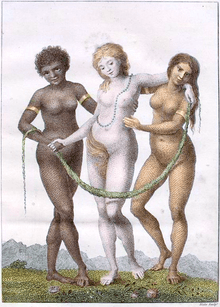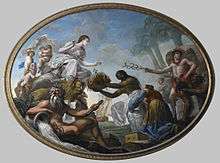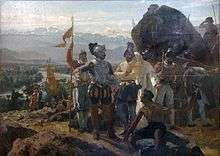
Whence the self-congratulation of “dominant” races, as if “dominant” meant “righteous” and carried with it a title to inherit the earth? ~ Anna Julia Haywood Cooper

William Blake, Europe Supported By Africa and America, 1796. Allegorical representation of a point of view on European colonization

"The East offering its riches to Britannia", painted by Spiridione Roma for the boardroom of the British East India Company
Colonialism is the establishment, exploitation, maintenance, acquisition, and expansion of colonies in one territory by a political power from another territory.
B

Everybody involved in the administration of the New World was blind to the simple truth enshrined in the first principles of law and government that nobody who is not a subject of a civil power in the first place can be deemed in law to be in rebellion against that power. ~ Bartolomé de las Casas

It should be recalled that the pretext upon which the Spanish invaded each of these provinces and proceeded to massacre the people and destroy their lands—lands which teemed with people and should surely have been a joy and a delight to any true Christian—was purely and simply that they were making good the claim of the Spanish Crown to the territories in question. ~ Bartolomé de las Casas
- When they laid down their arms, we murdered them. We lied to them. We cheated them out of their lands. We starved them into signing fraudulent agreements that we called treaties which we never kept. We turned them into beggars on a continent that gave life for as long as life can remember. And by any interpretation of history, however twisted, we did not do right. We were not lawful nor were we just in what we did. For them, we do not have to restore these people, we do not have to live up to some agreements, because it is given to us by virtue of our power to attack the rights of others, to take their property, to take their lives when they are trying to defend their land and liberty, and to make their virtues a crime and our own vices virtues.
- Marlon Brando speech for the Academy Awards protesting the treatment of American Indians, written by Brando, as it appeared in the New York Times (March 30, 1973)
C
- It should be recalled that the pretext upon which the Spanish invaded each of these provinces and proceeded to massacre the people and destroy their lands—lands which teemed with people and should surely have been a joy and a delight to any true Christian—was purely and simply that they were making good the claim of the Spanish Crown to the territories in question. At no stage had any order been issued entitling them to massacre the people or to enslave them. Yet, whenever the natives did not drop everything and rush to recognize publicly the truth of the irrational and illogical claims that were made, and whenever they did not immediately place themselves completely at the mercy of the iniquitous and cruel and bestial individuals who were making such claims, they were dubbed outlaws and held to be in rebellion against His Majesty. This, indeed was the tenor of the letters that were sent back to the Spanish court, and everybody involved in the administration of the New World was blind to the simple truth enshrined in the first principles of law and government that nobody who is not a subject of a civil power in the first place can be deemed in law to be in rebellion against that power.
- Bartolomé de las Casas, A Short Account of the Destruction of the Indies
- First we must study how colonization works to decivilize the colonizer, to brutalize him in the true sense of the word, to degrade him, to awaken him to buried instincts, to covetousness, violence, race hatred, and moral relativism; and we must show that each time a head is cut off or an eye put out in Vietnam and in France they accept the fact, each time a little girl is raped and in France they accept the fact, each time a Madagascan is tortured and in France they accept the fact, civilization acquires another dead weight, a universal regression takes place, a gangrene sets in, a center of infection begins to spread; and that at the end of all these treaties that have been violated, all these lies that have been propagated, all these punitive expeditions that have been tolerated, all these prisoners who have been tied up and interrogated, all these patriots who have been tortured, at the end of all the racial pride that has been encouraged, all the boastfulness that has been displayed, a poison has been instilled into the veins of Europe and, slowly but surely, the continent proceeds toward savagery.
- Aimé Césaire, Discourse on Colonialism (1955), pp. 35-36
- Whence this sneaking admiration we all have for bullies and prize-fighters? Whence the self-congratulation of “dominant” races, as if “dominant” meant “righteous” and carried with it a title to inherit the earth? Whence the scorn of so-called weak or unwarlike races and individuals, and the very comfortable assurance that it is their manifest destiny to be wiped out as vermin before this advancing civilization? As if the possession of the Christian graces of meekness, non-resistance and forgiveness, were incompatible with a civilization professedly based on Christianity, the religion of love!
- Anna Julia Haywood Cooper, A Voice from the South by a Black Woman of the South (1892), p. 51
D
- Those of us who make a mark use someone else's blood.
Our western stain won't wash away; it won't vanish in the flood.
- The Europeans looked down on the Black world and condescended to touch nothing but its riches.
- Cheikh Anta Diop, The African Origin of Civilization : Myth or Reality (1967)
F
- The colonized protect themselves from colonial alienation by going one step better with religious alienation, with the ultimate end result of having accumulated two alienations, each of which reinforces the other.
- Frantz Fanon, The Wretched of The Earth (1961), p. liii
- In some places the metropolis makes do with paying a clique of feudal overlords; in others, it has fabricated a fake bourgeoisie of colonized subjects in a system of divide and rule; elsewhere, it has killed two birds with one stone: the colony is both settlement and exploitation.
- Frantz Fanon, The Wretched of The Earth (1961), p. xlvi
- The famous dictum which states that all men are equal will find its illustration in the colonies only when the colonized subject states he is equal to the colonist.
- Frantz Fanon, The Wretched of the Earth (1961) as translated by Richard Philcox (2004), p. 9
- Colonialism is not a thinking machine, nor a body endowed with reasoning faculties. It is violence in its natural state, and it will only yield when confronted with greater violence.
- Frantz Fanon, The Wretched of The Earth (1961), p. 23.
- The colonial regime owes its legitimacy to force and at no time does it ever endeavor to cover up this nature of things.
- Frantz Fanon, The Wretched of The Earth (1961), p. 42.
- When the native hears a speech about Western culture he pulls out his knife—or at least he makes sure it is within reach. The violence with which the supremacy of white values is affirmed and the aggressiveness which has permeated the victory of these values over the ways of life and of thought of the native mean that, in revenge, the native laughs in mockery when Western values are mentioned in front of him.
- Frantz Fanon, The Wretched of The Earth (1961), p. 43.
- Colonialism and imperialism have not settled their debt to us once they have withdrawn their flag and their police force from our territories.
- Frantz Fanon, The Wretched of The Earth (1961), p. 57.
- Christopher Columbus landed first in the New World at the island of San Salvador, and after praising God enquired urgently for gold.
- C. L. R. James, The Black Jacobins (1938), p. 3
M
- The most modern pretense for colonial conquest is condensed in the slogan “raw materials.” Hitler and Mussolini tried to justify their plans by pointing out that the natural resources of the earth were not fairly distributed. As have-nots they were eager to get their fair share from those nations which had more than they should have had.
- Ludwig von Mises, Omnipotent Government: The Rise of the Total State and the Total War, Mises Institute (2010) p. 100. First published in 1944 by Yale University Press.
- On the other hand, the European authors of this article consider that they have a responsibility concerning the misdeeds of colonialism in Africa. Like Italy, Spain also resorted to a strategy of scorched earth in its colonies, including the use of poison gas (Kunz and Müller 1990). As in other Mediterranean countries, the Spanish massacres in Morocco and Equatorial Guinea (Pando Despierto 1999; Guerín 2008) have been deleted from cultural memory and replaced by nostalgic accounts of the empire. We have to help construct a critical memory that reviews the works of totalitarianism and racism in other continents, because our societies have to learn about a history that has been so often forgotten, sanitized or sweetened through popular films, books and magazines. ‘These new visual and textual formations... today shape the mental geography and the imaginary of people who travel blindly and unencumbered through geographic and historical space. As temporal distance increases, these popular constructions may even, one day, be regarded as factual truth and assimilated as knowledge by those who have only a remote inkling of colonial history’ (Norindr 1996: 158). By exposing colonialism, we may contribute to rethink its legacies in the present.
- Alfredo González-Ruibal, Yonatan Sahle and Xurxo Ayán Vila, “A social archaeology of colonial war in Ethiopia”, World Archeology, Vol. 43, (04, Mar 2011), p.16.
S
- In some places the metropolis makes do with paying a clique of feudal overlords; in others, it has fabricated a fake bourgeoisie of colonized subjects in a system of divide and rule; elsewhere, it has killed two birds with one stone: the colony is both settlement and exploitation.
- Jean-Paul Sartre, Preface to Wretched of the Earth (1961), p. xlvi
W
- What happened between their forefathers and our forefathers is so far back — right, wrong or indifferent — that I don't see why we owe them anything.
X
- I thank you for letting the people over in Europe know what the white man in this country is doing to black people and the hypocrisy he's practicing when he accuses them over there of not getting their house in order. Twenty million black people in this country have been just as thoroughly colonized by the American white man in a more shrewd modern way than all of the colonized people in Angola, South Africa, or any other part of this world. But the white man over here hides his own dirt by constantly pointing toward Britain and France and Portugal and all these other countries and accusing them of being colonial powers, when he mastered colonialism before these other counties ever knew what it was.
In fiction

If the Victorian vogue for adventure fiction in general seems to ride the rising tide of imperial expansion, particularly into Africa and the Pacific, the increasing popularity of journeys into outer space or under the ground in the late nineteenth and early twentieth centuries probably reflects the near exhaustion of the actual unexplored areas of the globe…. Having no place on Earth left for the radical exoticism of unexplored territory, the writers invent places elsewhere. ~ John Reider
- John Rieder notes, for example, that the rising thirst for exploration of alien worlds in fiction starting in the nineteenth century, cannot be detached from growing awareness of an impending disappearance of a certain kind of exploration. He remarks: If the Victorian vogue for adventure fiction in general seems to ride the rising tide of imperial expansion, particularly into Africa and the Pacific, the increasing popularity of journeys into outer space or under the ground in the late nineteenth and early twentieth centuries probably reflects the near exhaustion of the actual unexplored areas of the globe…. Having no place on Earth left for the radical exoticism of unexplored territory, the writers invent places elsewhere.
- Nonetheless, the crosscurrents flowing between representations of alien encounters and the politics of colonialism remain an enduring subject of interest for scholars as evidenced by the many articles examining the films, District 9 and Avatar, as allegories of colonial encounters. Indeed, Neill Blomkamp’s District 9 is arguably the work that first revealed the extent to which it was possible to bring together science fiction and the problematic of postcoloniality for those scholars of African literature and cinema who had not previously given any thought to science fiction as a viable genre for African writers or filmmakers. Since then, scholarly discussions of District 9 have proliferated, but not necessarily in tandem with references to the wider context for African science fiction.
- Moradewun Adejunmobi, “Introduction: African Science Fiction” , Cambridge Journal of Postcolonial Literary Inquiry, 3(3), September 2016. Cambridge University Press, 2016, University of California, Davis, p. 266.
- In the six years since Walking the Clouds was published, the world of science fiction has been transformed. The genre, once firmly associated with “the increasing significance of the future to Western techno- cultural consciousness” (Wesleyan Anthology of Science Fiction, qtd in Dillon, 2), has been reclaimed by postcolonial and Indigenous thinkers, who are using the genre to imagine decolonial futures. The increasing global interest in Indigenous and Afro-futuristic narratives demonstrates that this genre, to draw on Dillon’s words, has “the capacity to envision Native futures, Indigenous hopes, and dreams recovered by rethinking the past in a new framework”. But, rather than a recent development, speculative fiction has always belonged to these cultures: as Dillon notes in her introduction, “Indigenous sf [science fiction] is not so new – just overlooked”.
- "Walking the Clouds: An Anthology of Indigenous Science Fiction", edited by Grace L. Dillon. Reviewed by Rebecca Macklin; Decolonising Speculative Fiction. Eds. Isabelle Hesse and Edward Powell, 2018, p. 46.
- The purpose of a postcard, of course, is to show someone who is not present in a place what that place is like, by sharing an image—a cityscape, or countryside, or wildlife. The postcard thus “straddles two spaces: the one it represents and the one it will reach,” Alloula writes. He argues that the very flatness of the staged colonial postcards, with their plain descriptions of a foreign place and its people, persuaded French viewers of the photographs’ authenticity. But they were not plain descriptions; they were designed to convince those living in France that Algeria and its topless, trapped women were better off being colonized. The colonial postcard engages in the “rhetoric of camouflage,” Alloula argues. It is a “mirror trick” that “presents itself as pure reflection.” The colonial postcard “rests, and operates, upon a false equivalency—namely, that illusion equals reality. It literally takes its desires for realities.”
- Sarah Sentilles, "Colonial Postcards and Women as Props for War-Making", The New Yorker, (October 5, 2017).
- While there has been relatively little serious analysis of colonial postcards, Malek Alloula’s influential book Le Harem colonial put forward a reading of such postcards from the early 1900s as perpetuating a harem fantasy through which French male colonists viewed North Africa. This article analyses a selection of postcards of women from France’s Indochinese colonies at the same period, and suggests that Alloula’s thesis does not fit them in a comparable way. The Indochinese postcards borrow frames of reference from pre-existing pictorial styles, taken sometimes from the harem but also from chinoiserie and contemporary European photographic portraiture; rather than portraying a single vision of the ‘Other’ they oscillate between showing the Indochinese woman as ‘same’ and ‘different’. And these images appear to have been addressed primarily to a female collector, suggesting an intended reading rather removed from Alloula’s vision of colonial postcards as pornography.
- Jennifer Yee, "Recycling the ‘Colonial Harem’? Women in Postcards from French Indochina", French Cultural Studies, Volume: 15 issue: 1, page(s): 5-19, (February 1, 2004).
See also
External links
This article is issued from
Wikiquote.
The text is licensed under Creative
Commons - Attribution - Sharealike.
Additional terms may apply for the media files.